We asked people in 25 nations whether they think the U.S., China, Japan or the European Union is the world’s leading economic power. We also asked with which country – the U.S. or China – they see as a more important economic partner to their own nation.
- In most countries, people either view China as the world’s top economy or their opinions are split between China and the U.S.
- In 10 countries, the share of people who view China as the top economy has increased significantly since 2023.
- In most places surveyed, people prioritize close economic ties with the U.S. over China, though the share who prioritize China has increased in most countries while the share who prioritize economic ties with the U.S. has shrunk as of recently.
- People on the ideological left are more likely than those on the right to prioritize a close economic relationship with China.
Which country is the world’s top economy?
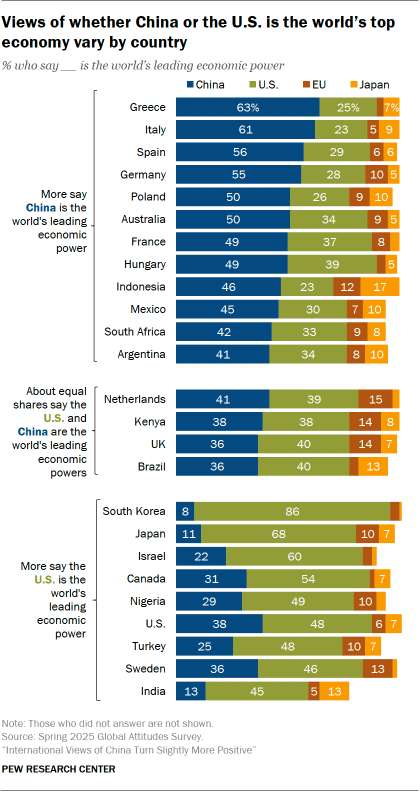
China is viewed as the top economy in 12 countries spanning regions and income levels. This is the most common view in most European countries surveyed, held by majorities in Germany, Greece, Italy and Spain, and by roughly half of adults in France, Hungary and Poland.
By comparison, the U.S. is seen as the top economy in nine countries –including the U.S. itself, where 48% of adults hold this view. Majorities in Israel, Japan and South Korea agree.
Opinion is split in Brazil, Kenya, the Netherlands and the UK, where similar shares call China and the U.S. the top economy.
Relatively few in any country surveyed point to Japan or the EU as the world’s top economic power.
Views over time
The balance of opinion on which country is the world’s leading economic power has shifted toward China in recent years.
- In 10 countries, the share of people who say China is the world’s top economy has increased since 2023. In India and Turkey, where we last asked this question in 2019, the share of adults who see China as the top economy has also increased slightly.
- In eight countries, the share of people who see the U.S. as the world’s top economic power has decreased since 2023. In India, it has decreased since the last time we asked in 2019.
- Canada is a notable exception. Today, Canadians are 10 points more likely than in 2023 to call the U.S. the leading economic power – and 9 points less likely to name China.
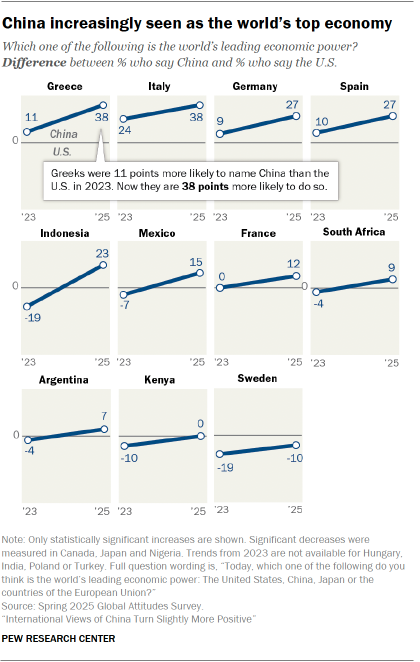
When comparing the share of people in each country who name China as the top economy and the share who name the U.S., a clear trend emerges: In many countries with available data, the balance of opinion is shifting in China’s direction.
For example, in 2023, 35% of Indonesians said the U.S. was the world’s leading economic power, while 16% said China – a gap of 19 points in favor of the U.S. This year, 23% of Indonesians name the U.S., while twice as many (46%) name China – a gap of 23 points in favor of China.
In 2023, people in Argentina, France and South Africa were about equally likely to name the U.S. and China as the world’s top economy. Today, they are significantly more likely to name China than the U.S. And in Germany, Greece, Italy and Spain, people were already more likely to name China in 2023, but the gap is even wider today.
In Sweden, people still view the U.S. as the world’s leading economic power, but the margin over China has shrunk significantly. And in Kenya, the gap has disappeared entirely.
In India and Turkey, we last asked this question in 2019. Adults in both countries were, and remain, more likely to view the U.S. is the top economy, though the margin is now smaller.
In some countries, the balance of opinion increasingly favors the U.S. This is true in Canada, Japan and Nigeria. Canadians were about equally as likely to name China and the U.S. as the top economy in 2023. Now, they’re 23 points more likely to name the U.S. (The Canadian survey was conducted during a time of rapidly shifting policies affecting U.S. tariffs on Canada and Canadian tariffs on the U.S. For more on our survey fieldwork timeline, refer to Appendix A.)
There has been no significant change in the balance of opinion in the Netherlands, where China and the U.S. are seen as equally powerful economies. And adults in Israel, South Korea and the U.S. itself have been consistent in their belief that the U.S. is the world’s leading economy.
Economic ties with the U.S. seen as more important than ties with China
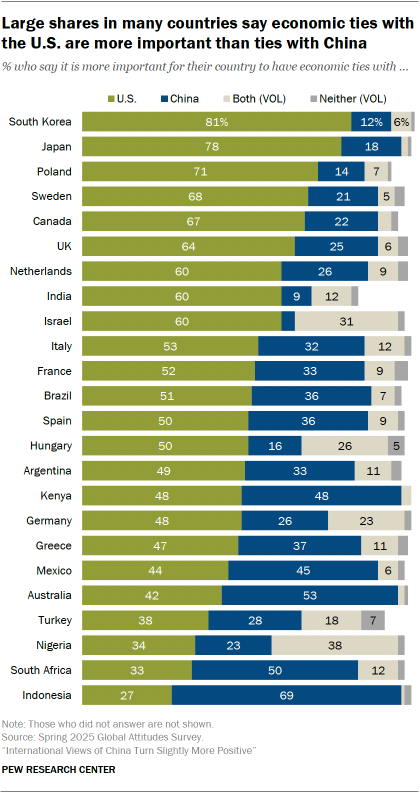
Though China is increasingly seen as the world’s top economy, people in most nations surveyed say it is more important for their country to have strong economic ties with the U.S.
Majorities in nine countries say ties with the U.S. are more important, while roughly half of adults say the same in another nine.
In Kenya and Mexico, opinion is split: Roughly equal shares prioritize close economic ties with the U.S. and with China.
Only in Australia, Indonesia and South Africa do the largest share of adults say economic ties with China are more important than ties with the U.S.
Notably, roughly a quarter of adults or more in Germany, Hungary, Israel and Nigeria volunteer that ties with both China and the U.S. are important to their country.
Views over time
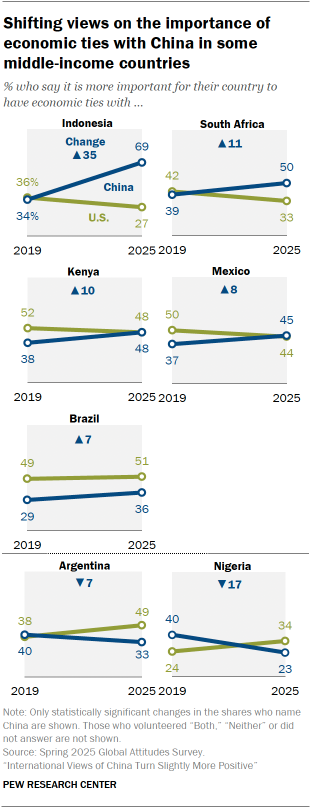
In nearly all of the high-income countries surveyed, majorities continue to prioritize close economic ties with the U.S. Though in most of these places the shares who say ties with China are more important has grown since 2021.
In several middle-income countries, the balance of opinion has shifted since 2019, when the question was last asked.
For example, Indonesians and South Africans in 2019 were as likely to prioritize economic ties with the U.S. as they were to prioritize ties with China. Now, their economic relationship with China holds significantly more importance.
In Kenya and Mexico, where the U.S. was once seen as a more important economic partner by a substantial margin, opinions are now split. And in Brazil, the share who prioritize ties with China has grown (though a larger share still consider U.S. ties more important).
The opposite is true in Argentina and Nigeria, where adults are significantly less likely to prioritize economic ties with China now than in 2019.
Related: Views of the U.S. have worsened while opinions of China have improved in many countries
Views by ideology and confidence in Trump
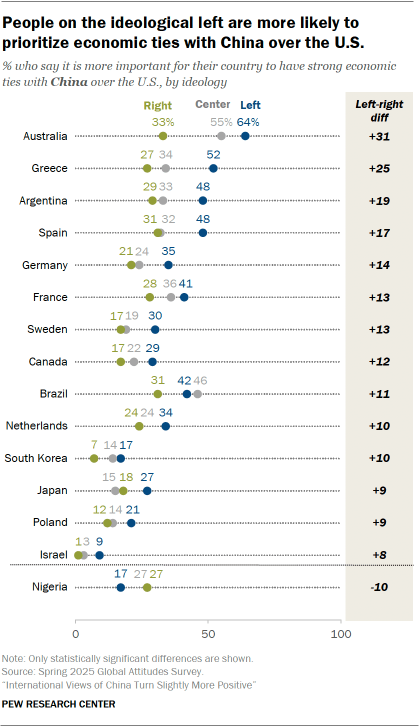
People on the ideological left are more likely than those on the right to prioritize economic ties with China.
The difference is largest in Australia, where a 64% majority of adults who place themselves on the left prioritize ties with China over the U.S., compared with a third of those on the right.
Conversely, people on the right tend to prefer partnership with the U.S. over China. Indeed, those on the ideological right tend to have more positive views of the U.S. and Trump, and more confidence in him to handle the global economy.
In most countries surveyed, people who are not confident in Trump’s handling of the global economy name China as their key economic partner (over the U.S.) at a higher rate than those who are confident. For example, 42% of Argentines who lack confidence in Trump’s handling of the economy say it’s more important for Argentina to have strong ties with China; among those who have confidence in Trump, 19% say this. Conversely, Argentines with confidence in Trump on economic issues are 27 points more likely to prefer close ties with the U.S.




